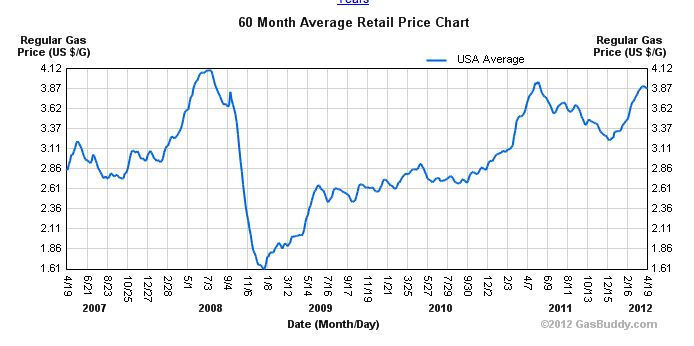Blind Spot: Digging Deeper Into GM's Fuel Economy Record
Old habits die hard. Whether it’s GM’s desire to slice-and-dice its fuel economy achievements to make them look better than they are, or our instinct to correct the record, it’s all just a little bit of history repeating.
GM, like most of the Detroit automakers, has never had an easy time marketing its fuel economy achievements. With a huge percentage of its sales and an even higher percentage of profits traditionally coming from full-sized trucks and SUVs, GM has had to respond to rising gas prices with some questionable claims. Perhaps the most infamous: 2008’s campaign touting the assertion that Chevrolet sold more cars getting 30 MPG on the highway than Honda or Toyota. Not only did this claim ignore the most accurate measures of fleet-wide efficiency, but it also stretched the truth rather badly. When TTAC’s readers analyzed this claim, they found that Chevy was counting different bodystyles as different models, effectively “double counting” cars like the Aveo (which was counted the four- and five-door models as separate cars). When the same counting technique was applied to Toyota’s model range, it was shown to have even more 30 MPG-capable cars than Chevy, essentially invalidating what was already a fairly marginal marketing claim.
But since 2008, the pressure has only mounted on GM to show improvement in its fuel economy. Though gas prices aren’t higher than they were back in the Summer of ’08 (yet), GM’s bailout has created a new kind of pressure. As I pointed out in a December 2010 NY Times Op-Ed, President Obama’s green justification for the bailout seemed to be something of a mirage. With gas prices then falling and pickup and SUV sales picking back up, Detroit was hardly living up to Obama’s vow that
This restructuring, as painful as it will be in the short term, will mark not an end, but a new beginning for a great American industry. An auto industry that is once more outcompeting the world; a 21st-century auto industry that is creating new jobs, unleashing new prosperity and manufacturing the fuel-efficient cars and trucks that will carry us toward an energy-independent future.
Now, not only is GM facing pressure put on it by a President who seemed to offer fuel economy leadership from Detroit as a public reward for the public’s investment, but gas prices are also beginning to rise once more. And though GM has absolutely improved its fuel economy in the meantime, it still significantly lags the rest of the industry on an objective fleet-wide basis. And what’s worse, it’s marring its modest but admirable achievements by falling back on the old “most models over 30 MPG” chestnut.
In a post titled “Digging Into GM’s Fuel Economy Record” at his new “BTW” blog, GM’s VP for Communication Selim Bingol resurrects GM’s pre-bailout canard by arguing
GM has been selling a lot of fuel-efficient vehicles in many different sizes and styles – and more than you may think.
Just look at March. We sold more vehicles in the United States that deliver an EPA-estimated 30 mpg or better on the highway than ever before – more than 100,000 – and the figure includes cars like the Chevrolet Camaro V-6 and crossovers like the GMC Terrain.
It might surprise you to know that these results make GM far and away the leader among the “Detroit” Three automakers, and we’re not that far off the pace set by Toyota.
So, instead of “more models over 30 MPG than Toyota,” GM is claiming 30 MPG option leadership over its Detroit competitors. And, to its undying credit, it’s not misleading the public by double-counting models this time around. Thanks to its genuinely improved offerings, GM legitimately has 12 options rated at over 30 MPG on the highway. On the other hand, the fact that GM sells more 30 MPG cars than its Detroit competitors is, as Bingol admits, at least
partly a function of our scale.
But although Bingol makes a more credible case for the “more models over 30 MPG” claim than his predecessors, achievements like these don’t get better with age. For one thing, the competition has moved on: Hyundai, for example, now reports the percentage of its sales that are rated at 40 MPG on the highway… some 41% as of March. Bingol as good as admits that GM is still playing catchup when he notes
Of course, 30 mpg is not the goal line. We can and will move the needle higher because customers and our CAFE commitments demand it. Soon enough, 40 mpg will be the new 30.
Here’s the thing: it already is. GM is touting a claim that might have been impressive four years ago… had it been accurate. Today, with well over 20 models available with at least 40 MPG highway ratings, it’s a yawner.
But not only has the industry moved on since 2008, the market has as well. Thanks to the rise of sites like TrueCar and Edmunds, consumers have access to more data on new cars than ever before. And since transparency has improved in the auto market, there are now far more accurate ways to compare manufacturer fuel economy than existed in 2008. With the fuel economy leader Hyundai self-publishing its sales-weighted fleet fuel economy numbers, TrueCar has stepped in to provide similar data for the entire industry. And isn’t the best way to compare fuel economy by measuring what the manufacturers actually sell?
By this measure, however, GM does not come out looking like an industry leader. In fact, as a manufacturer, GM doesn’t even make the industry average fuel economy. And its greatest deficit is in the car segments, where it’s nearly two MPG off the industry average. Moreover, GM’s rate of improvement in March was one of the lowest in the industry, which means it’s actually falling behind the competition. By brand, the picture is similar: each of GM’s brands comes in below the industry average, with truck-free Buick coming the closest at just .1 MPG off the mean.
This is not to say that GM hasn’t made improvements. As Bingol points out, GM sells a far more balanced mix of cars, trucks and crossovers than ever before. By segment, GM’s offerings beat the industry average for Large Cars, Large and Small Trucks and Large and Midsized SUVs. In fact, TrueCar shows that GM’s Midsized SUV offerings are by far the most efficient in the industry, at 24.1 MPG compared to a 21.9 MPG average.
Though these are clearly signs of movement in the right direction, they’re not enough to give GM a credible claim to fuel economy leadership… even among the Detroit automakers. But then, that was fairly apparent from the moment The General dusted off an ineffective marketing claim from 2008. Thanks to the relatively slow run-up in gas prices, pickup and SUV sales are remaining strong and GM needs their profits far more than it needs to become a fuel economy leader. But if the market experiences another Summer ’08-style rush towards high-efficiency cars, GM is going to have to come up with a better pitch to economy-minded consumers. And ultimately, it’s going to have to work harder than everyone else if it ever wants to make good on Obama’s promise of fuel economy leadership.
More by Edward Niedermeyer
Latest Car Reviews
Read moreLatest Product Reviews
Read moreRecent Comments
- ToolGuy "All this means that you, the car buyer, have likely at some point in your life bought a new or thoroughly redesigned model during its first model year and experienced problems." 👉️ No, actually, never, because I don't do that.
- ToolGuy Thankfully some of us have the TTAC Podcast to guide us.
- Pete Skimmel That all makes sense to me, find a way to pay for value received. Everyone wins.
- El scotto @jalop His maintenance costs are about right. Sorry about your alternative reality.
- Kwik_Shift_Pro4X Just because you don't see many of them on the road doesn't mean they go up in value. I'm sure finding parts for it will be an adventure. 🙄




































Comments
Join the conversation
The op is either the biggest troll or has no shame. This article puts many of Bertel's sleazy manipulative articles and half truths to shame. Fat rusho and faux news are wondering how soon they can put on their payrolls. "it still significantly lags the rest of the industry on an objective fleet-wide basis." Who comes up with **** like this for you guys? How is that a GM's problem? Should they deny a sale to anyone looking for a pickup truck? Should they force a Tahoe buyer to buy a Sonic instead? You could walk into a GM dealership now and buy any car/truck and bet that that is probably the most fuel efficient in its segment. Most fuel efficient sub compact - GM Most fuel efficient compact - GM Most fuel efficient non hybrid midsize - GM Most fuel efficient full size - GM Most fuel efficient mid size cuv - GM Most fuel efficient large CUV with V6 - GM Most fuel efficient luxury midsize - GM
You see clearly there is absolute initiative to lie like Hyundai has, why because while they did it and it was wrong, they reap the benefits for years later. The problem is the marketing of said lie hasn’t really stopped, just tweaked, and who really hears about a court case involving the wrong MPG on the line up, a few journalists? Definitely NOT the public.